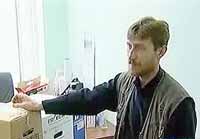Piracy case puts Russian village schoolteacher on trial, Microsoft in spotlight
Russian President Vladimir Putin ridiculed it as "utter nonsense." Former Soviet leader Mikhail Gorbachev called it a "show trial."

The case of a village school principal who allegedly oversaw the installation of pirated versions of Microsoft software on 12 school PCs has triggered incendiary commentary and strong denials.
Russian and Western officials alike have long held that Russia the worst pirate market after China needs to get tough on the pirates: Bootleg software can be found in secondary schools and other public facilities and in street markets around the country.
Violations of intellectual property law were cited as a major impediment to an agreement with the U.S. signed in November after years of wrangling paving the way for Russia to join the World Trade Organization.
But as a test case for a crackdown on piracy, the prosecution seemed badly misaimed, targeting a small-town school director in the Ural Mountain region of Perm, about 1,000 kilometers (620 miles) east of Moscow.
Observers have criticized Microsoft on the assumption that a powerful Western corporation was bringing its corporate might to bear on one man criticism the corporation flatly denies.
The case appears to have more to do with the lopsided approach taken by prosecutors eager to please the leadership in Moscow in response to international pressure on Russia to clamp down on piracy.
"You know the president is always asked these questions at summits evidently because of this, work has been stepped up," Alexander Troyanov, the district prosecutor pursuing the case, told The Associated Press.
But Putin himself has questioned the rationale behind the case. When it was raised by a reporter at his annual, nationally televised news conference this month, the president dismissed it with a colorful term that translates as "utter nonsense." As in fighting drugs, the manufacturers and producers should be targeted rather than the end user, he said.
Troyanov argued that the law makes no distinction meaning Ponosov is fair game.
"Producers, sellers and users all bear responsibility," he said. "After our investigation we decided that the software had been loaded either with his knowledge or by his direct order."
Troyanov said seven anti-piracy cases were brought last year in the region where he works, including against people selling counterfeit products. As for investigating who produced the software in the first place, Troyanov said only that work on the case "would be continued."
For many Russians who have seen him on television, Ponosov hardly fits the stereotype of a hardened criminal.
Thin, with a bushy beard, Ponosov commands a monthly salary of US$360 (Ђ278) per month as head of the school in the village of Sepych, where he teaches history.
In a hearing Tuesday, Russian television showed footage ofhim turning down the offer from a Microsoft representative of an out-of-court settlement. For that, Ponosov would have to issue an apology to the company and acknowledge his guilt. Microsoft would then petition prosecutors to drop the claims.
"Of course I didn't suspect that it was pirated," he said in a telephone interview last week.
After an inspection of the school last May, prosecutors opened a criminal case against Ponosov, claiming he had installed the software and had illegally allowed staff and children to continue using the computers. Ponosov counters that the computers came with software pre-installed, and he allowed the computers themselves and not the software to be used.
"The programs came installed in the computers already. They worked fine, the only thing was that they didn't come with any documentation," he said.
Ponosov, who was shown lovingly describing his collection of religious icons in a television news report Monday, was propelled further into the spotlight when Gorbachev unexpectedly took up his case.
In an open letter addressing Microsoft Chairman Bill Gates personally, the Nobel prize winner and former Soviet leader warned that Ponosov faced "Siberian camps."
Ponosov could be sentenced to five years in prison if convicted, but Troyanov speaking after Putin's criticism of the case said his punishment would likely be far softer.
Microsoft's response was swift: the company had nothing to do with the charges against Ponosov and had even turned down the opportunity of joining the lawsuit, company spokeswoman Olga Dergunova said in a statement.
"In general, we do not believe that a case of this kind warrants criminal prosecution, given the very small number of computers involved, and the fact that the computers were purchased for use by students," she said in the company's latest statement Monday.
Gorbachev acknowledged that Microsoft was not to blame at the end of last week, the U.S. company said.
"I read about it on the Internet. It's very pleasant that he (Gorbachev) got involved." said Ponosov, who did not blame Microsoft for the prosecutors' attention, reports AP.
"I don't think this is Microsoft's strategy ... It doesn't benefit them," he said.
Konstantin Zemchenkov, who coordinates the Motion Picture Association of America's Russian anti-piracy efforts, said the case did no one any good.
While Microsoft's rights appeared to have been violated, Zemchenkov said, a better target would be Russia's vast infrastructure for pirating software, music and films. With 52 factories running 77 optical disk lines throughout the country, capacity is far greater than required to meet legal demand and amounted to a "huge army for producing counterfeit goods," he said.
"There are hundreds of pirate markets, hundreds of warehouses. To bring this case does not look good."
Subscribe to Pravda.Ru Telegram channel, Facebook, RSS!

